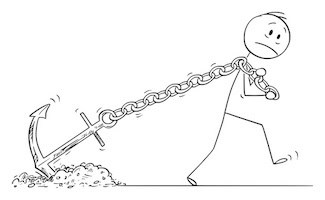I recently answered a query on LinkedIn:
New LinkedIn data shows that the number of “boomerangs,” or employees who left a company for a certain amount of time and then returned, is rising — and it’s even higher at top employers.
We’d love you to weigh in: What advice do you have for employees returning to work at a previous employer?
The short answer: Clear out any emotional baggage about your decisions so that you can be 100% settled in your choice to return. This means looking carefully at why you left and what you learned that caused you to return. You probably feel some ambivalence about what happened. Processing those conflicting emotions is critical to a healthy start at your new job. The same general process applies to moving forward after flip-flopping on any major decision.
There were word limits on LinkedIn, so here’s the long version of the advice!
Did you make a mistake when you left?
First of all, I recommend you analyze whether or not you made a mistake to leave. The goal is not to criticize yourself; it is to learn from any mistake you made so that you don’t repeat it in the future.
Some mistakes are easy to learn from because you just didn’t know and couldn’t have been expected to know. For example, suppose you discovered that your boss where you went was dishonest. You probably couldn’t have figured that out during the interview process. That said, it’s worth reviewing to see if there were any hints of problems that you will pay attention to in the future.
Other mistakes are a little more painful to analyze because you feel guilty about them. This guarantees it will be unpleasant to revisit them. But your choice is to take the short painful hit to analyze them now or to carry a small load of guilt around indefinitely. There is always some new self-understanding to gain when you introspect guilt and deal with it. You may need to forgive yourself. By facing any mistakes and learning from them, you heal some old wounds and come to peace with your decision so you can move on.
Are there values at your company that you hadn’t appreciated?
When you’re looking for mistakes, keep an eye out for lessons learned about the value of the company you’ve returned to.
For example, when I was working as an engineer, a co-worker left us and returned less than a month later. He had not fully appreciated our benevolent corporate culture. Everybody in the 80-person company got along pretty well. Everybody was focused on success. It was a friendly, productive environment and we got a lot done.
Sometimes it’s hard to appreciate a value until you’ve lost it.
It’s worth making a list of all the positives about your company that you got clearer on as a result of your time away. Don’t gloss over this. I recommend you write a paragraph for each one. Why is it better here? What did you learn about why it matters to you? Why does being back here make your life better? Maybe it’s the culture. Maybe it’s the flextime policy. Maybe it’s the work ethic. Maybe it’s the intellectual stimulation.
These are your values. Working at this company makes it easy to gain and keep them. Getting clear on the values puts them on your radar. Instead of taking them for granted, you will experience the pleasure of gratitude whenever they come up. This is an easy way to add positive affect to your work experience.
What problems still exist and how will you deal with them?
You may need some positivity to help you through the rough spots. After all, the company you returned to is the same company you left.
Corporate culture, corporate policies, and corporate personnel don’t change quickly. If there were problems at the company that motivated your exit, you need to figure out how you will deal with them constructively so that they don’t undermine your new career there.
Some people might say you need to just accept the facts and suck it up. That is “the best you can do.” “You made your bed and now you need to lie in it.”
I don’t recommend settling like this. Rather, find a creative way to deal with the problem — one that is under your control and meets your needs whatever they are. Guaranteed, the solution is not obvious or you would have addressed the problem earlier.
My basic recommendation is to take a value-oriented approach to dealing with it. By analyzing the situation in terms of the values you want to gain, instead of the problem you want to eliminate, you open up more possibilities for action. The key is to find an alternative that is under your control, one that doesn’t require other people to change their minds or behavior. It is always possible. If it seems impossible, perhaps you need to strengthen some communication skills, such as how to communicate effectively in emotionally charged situations.
You’ve made a new commitment to this company. It’s worth making sure you follow through on that commitment. Part of doing that will be figuring out how to be perfectly happy working there despite the fact it’s not perfect.
Flip-flopping on a major decision takes a toll on your time, energy, and relationships. Learning from the flip-flop and figuring out how to meet your needs regardless of the situation will ensure you flourish with this decision and are prepared for the next one when that’s appropriate.









0 Comments